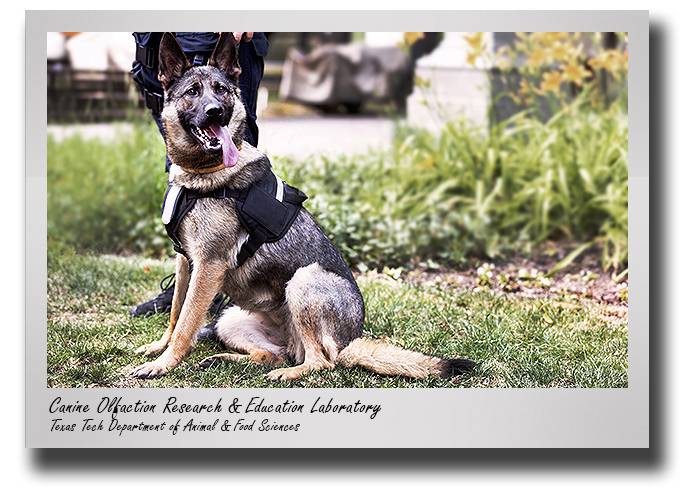AFS’s Hall studies impact of climate on dogs' ability to detect explosives
By: Elyssa Sanders
 Two Texas Tech researchers have received a $270,717 cooperative agreement from the
U.S. Army Research Office to study how environmental factors impact the performance
of explosives-detection dogs. Funding for this study is provided by the Defense Health
Agency as part of a larger portfolio supporting Military Working Dog basic research.
Two Texas Tech researchers have received a $270,717 cooperative agreement from the
U.S. Army Research Office to study how environmental factors impact the performance
of explosives-detection dogs. Funding for this study is provided by the Defense Health
Agency as part of a larger portfolio supporting Military Working Dog basic research.
 The project hopes to allow a better understanding of the odor fate of important explosives
under different environmental conditions, while simultaneously studying the limits
of canine detection. Together, these experiments will evaluate their interrelated
effects and help inform the canine community of better ways to acclimatize dogs and
mitigate environmental impacts on their detection.
The project hopes to allow a better understanding of the odor fate of important explosives
under different environmental conditions, while simultaneously studying the limits
of canine detection. Together, these experiments will evaluate their interrelated
effects and help inform the canine community of better ways to acclimatize dogs and
mitigate environmental impacts on their detection.
The research team is led by Nathaniel Hall, an assistant professor of companion animal science in Tech's Department of Animal and Food Sciences, and Paola Tiedemann, a research associate professor of forensic science in Tech's Department of Environmental Toxicology.
Because of their superior sense of smell and tolerance for extreme working conditions, canines serve as a critical line of defense against security threats involving explosives and firearms. However, despite the prominence of EDDs in military and law enforcement operations, very little is known about how atmospheric conditions impact their odor-recognition capabilities, let alone what can be done to mitigate any negative performance outcomes.
Spanning May 2021 to May 2022, the research contract is an interdisciplinary collaboration between Hall's Canine Olfaction Research and Education Laboratory and Tiedemann's Forensic Analytical Chemistry and Odor Profiling Laboratory.
By studying the psychological and physiological impact of extreme weather and other environmental factors on canine odor detection, Hall and Tiedemann are exploring virtually uncharted territory. This emerging research could uncover effective strategies for boosting canine performance in extreme climates.
CONTACT: Chance Brooks, Interim Chair and Professor, Department of Animal and Food Sciences, Texas Tech University at (806) 742-2808 or chance.brooks@ttu.edu
1012NM21
Davis College NewsCenter
-
Address
P.O. Box 42123, Lubbock, Texas 79409-2123, Dean's Office Location:Goddard Building, Room 108 -
Phone
(806)742-2808 -
Email
kris.allen@ttu.edu
